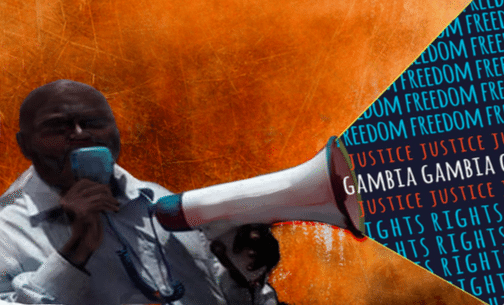Authorities in Gambia must free dozens of political prisoners and end the brutal crackdown on the rights to freedom of expression and peaceful assembly ahead of elections later this year or face suspension from the Economic Community of West African States (ECOWAS), Amnesty International said in a new report published today.
Dangerous to Dissent: Human Rights Under Threat in Gambia,launched two days before ECOWAS Authority of Heads of State and Government meet in Dakar and six months before Gambia’s presidential elections, outlines the brutal repression of opposition demonstrations in April and May 2016. Dozens of peaceful protesters and bystanders were beaten by police and arrested and 51 people, including the leader of the United Democratic Party (UDP) and several members of the executive, are awaiting trial. At least 36 more people remain detained without charge and one man — Solo Sandeng, the UDP National Organizing Secretary — died in custody after having been tortured.
“Gambia’s elections are just six months away and yet opposition members are arrested and beaten, journalists are muzzled, and civil society muted,” said Alioune Tine, Amnesty International Regional Director for West and Central Africa.
“Gambia has a long and brutal history of repression of critical voices, and demonstrators such as Solo Sandeng have paid a high price for peaceful protest.”
Nogoi Njie, a businesswoman arrested on April 14 and currently detained, describedin an affidavit filed at the High Court how she herself was tortured at the NIA. She explained how she was beaten with hose pipes and batons by men clothed in black hoods and black gloves while water was poured over her.
On May 29 President Jammeh told magazine Jeune Afrique that “People die in custody or during interrogations, it’s really common. This time, there is only one dead and they want investigations? No one can tell me what to do in my country.”
The report outlines patterns of violations since the last presidential elections in November 2011, which ECOWAS refused to monitor due to “intimidation, an unacceptable level of control of the electronic media by the party in power, the lack of neutrality of state and para-statal institutions, and an opposition and electorate cowed by repression and intimidation.”
Since that time new laws have been introduced to further restrict the right to freedom of expression, such as laws repressing online dissent, and three media outlets have been closed on five different occasions. Dozens of journalists have fled the country because of persecution.
A civil society activist told Amnesty International: “You don’t feel safe anywhere, even in your home. You don’t trust even your maids or drivers. You can pay someone $10 and they will give information. In public spaces you don’t speak about sensitive things or in public transport. You are trying to protect yourself and your family and want to keep safe.”
A journalist in exile told Amnesty International: “You don’t know who is going to report you. You don’t know who is behind you. You don’t know who is paid by the NIA to be an informant.”
Amnesty International calls on the international community to consider stronger measures if Gambia does not make significant progress towards meeting its human rights obligations under international law. In particular, Amnesty International is calling ECOWAS – whose leaders meet for a Summit on June 4 in Dakar – to take action to ensure that its own rules are respected and fully observed. In addition to a commission of inquiry into the recent repression of opposition protests, Amnesty International is calling for ECOWAS to consider the possible suspension of Gambia if no progress on human rights is made.
“If ECOWAS is serious about being a community of states that respect and promote the human rights of their people, it can no longer remain silent as one of its members so flagrantly disregards its treaty obligations,” said Tine.
“ECOWAS should speak out on the deplorable situation in the country and engage with the Gambian authorities to secure the release of political prisoners, the repeal of repressive laws and to ensure judgments of the regional court are fully enforced. If the Gambian government refuses to comply, ECOWAS should consider suspension until Gambia’s obligations are met.”
Background
Between January 2015 and May 2016, Amnesty International researchers interviewed 127 individuals, including victims and eyewitnesses of human rights violations, relatives of victims, UN and INGO representatives, diplomats, lawyers, human rights defenders, representatives of civil society organizations, journalists, opposition members, academics, former members of security forces and sources from telecommunications companies. Relevant desk research was also undertaken, such as review of media reports, UN and civil society reports, court documents and video footage.
Amnesty International wrote to the president of Gambia on May 2, 2016, copying relevant government ministries, requesting an official response to the concerns raised in this report. No response was received despite repeated follow up.

